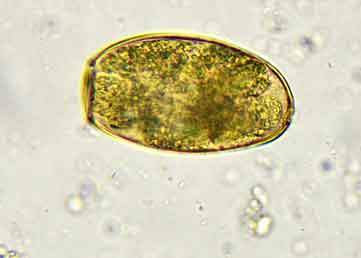Lung Flukes
(Paragonimus spp.)
There are numerous species of Paragonimus known to infect dogs through the consumption of undercooked crustaceans. These trematodes are capable of causing serious clinical signs and may be fatal if left untreated. Many lung fluke species are zoonotic.
| Parasite: Paragonimus westermani, Paragonimus heterotremus, Paragonimus skrjabini complex, Paragonimus mexicanus,, among others (at least 28 species) |
| Common name: Lung flukes |
| Host: HumansHumans, canids, felids, rodents |
| Pre-patent period: 60-90 days |
| Location of adults: Lung parenchyma |
| Distribution: East Asia, Central and South America, Africa |
| Transmission route: Oral (ingestion of crustaceans or wild boar) |
| Zoonotic: Yes |
Distribution
Paragonimus spp. are distributed throughout the tropics. Paragonimus westermani, P. skrjabini complex and P. heterotremus are distributed through India and SE Asia. Paragonimus. Paragonimus mexicanus, P. peruvianus, P. ecuadoriensis and P. inca in Central and South America. Not all species of lung flukes in Central and South America are reported to infect dogs, however, infection is possible if access to infected hosts is present.
Clinical signs
Infection may be asymptomatic or include fever, cough, haemoptysis and dyspnoea. Sudden death owing to bilateral pneumothorax has also been reported. Ectopic infections may produce subcutaneous nodule formation, lymphadenopathy, lymphadenitis and cellulitis.
Diagnosis
The diagnosis of lung fluke infection in dogs is based on the detection of characteristic large, oval, tanned operculated eggs with a fully developed miracidium (Fig 1) by faecal sedimentation (SOP 4).
Thoracic radiographs may reveal pulmonary nodules, congestion, pleural effusion and pneumothorax.

Figure 1 Paragonimus egg with a distinct operculum (‘cap’). (Image credit: Shutterstock)
Treatment
Off-label use of oral praziquantel given at 75 mg/kg/day (can be divided) for 2 days is reported effective at killing adult lung flukes.
Control
Owners should be advised not to feed their dog raw or undercooked crustaceans (e.g. crabs, crayfish, prawns) or wild boar/pig meat. For further control options, refer to the General Considerations and Recommendations section.
Public health considerations
Humans become infected through the ingestion of undercooked crustaceans or pork infected with metacercariae of lung flukes. Dogs may act as reservoirs for human infection by contaminating the environment with lung fluke eggs. Humans infected with lung flukes may present with cough, often with haemoptysis. Ectopic infections are also possible.
